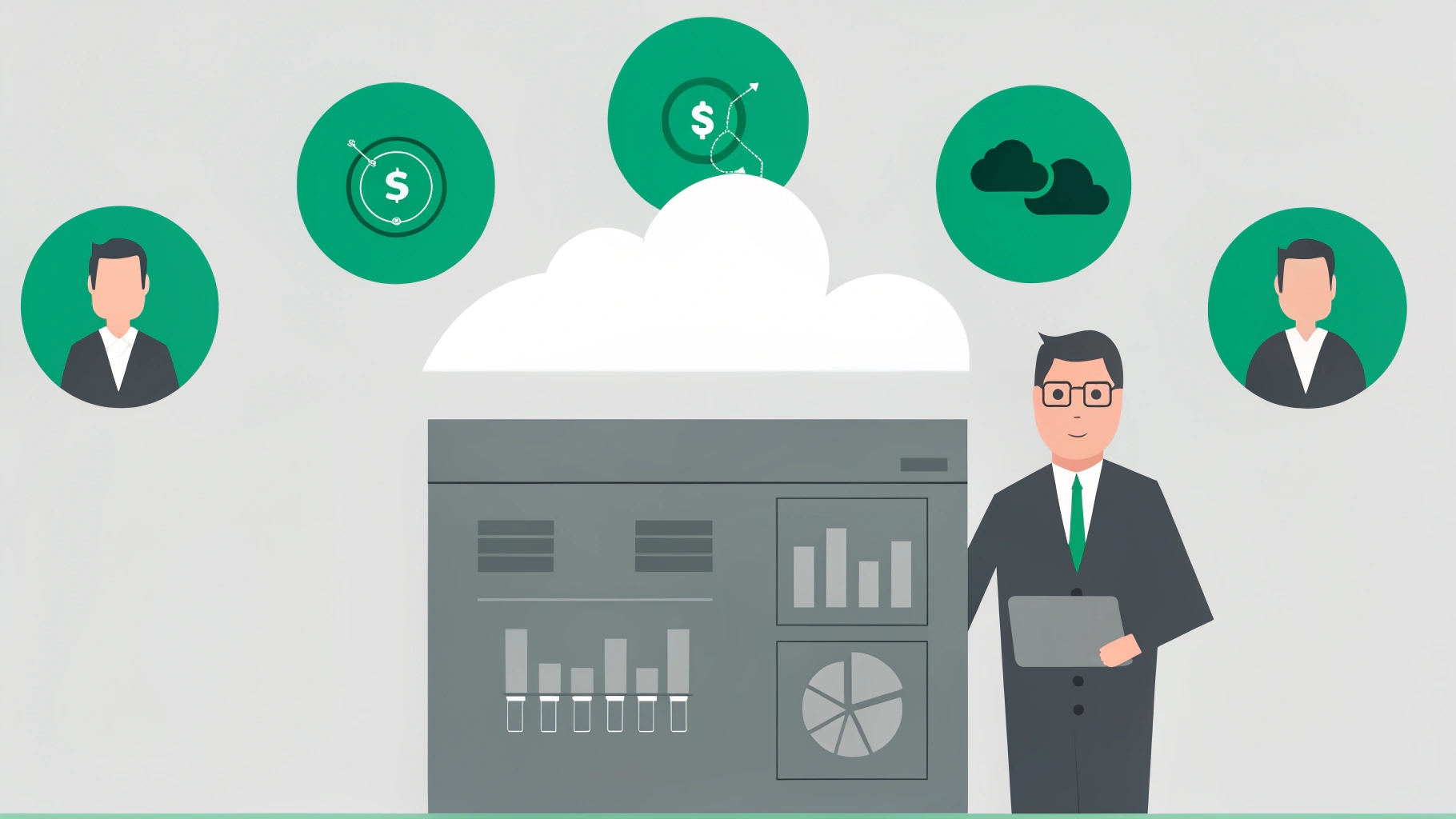Overview
Enterprise Resource Planning (ERP) is defined as a comprehensive software solution that integrates essential organizational functions, optimizing operations and enhancing effectiveness. For operations managers, the significance of ERP cannot be overstated. Its features, such as real-time data processing and centralized management, significantly improve decision-making processes, reduce costs, and drive productivity. Many organizations report substantial operational benefits following its implementation.
Consider the impact of ERP on your organization. By streamlining processes and providing timely insights, ERP empowers managers to make informed decisions swiftly. This leads to increased efficiency and a competitive edge in the market. In fact, organizations leveraging ERP systems often experience remarkable improvements in their operational performance.
In conclusion, adopting ERP is not merely a choice; it is a strategic necessity for organizations aiming to thrive in today’s fast-paced business environment. Embrace the potential of ERP to transform your operations and drive your organization forward.
Introduction
Enterprise Resource Planning (ERP) stands as a cornerstone of modern business operations, streamlining processes and enhancing productivity across various sectors. By integrating critical functions such as finance, HR, and supply chain management, ERP systems not only optimize operations but also empower organizations to make data-driven decisions. As companies increasingly rely on these solutions, a pivotal question emerges: what are the key features that render ERP systems indispensable? Moreover, how can they transform operational efficiency in a rapidly evolving marketplace?
Define ERP: Understanding Enterprise Resource Planning
The ERP definition explains that Enterprise Resource Planning is a comprehensive software solution that organizations leverage to manage and integrate essential functions. By unifying processes such as planning, purchasing, inventory management, sales, marketing, finance, and human resources, ERP solutions significantly optimize operations and enhance overall effectiveness. This integration is crucial; it eliminates data silos and fosters a centralized database, providing a single source of truth for all organizational activities. Consequently, organizations are empowered to make informed decisions and refine their strategic planning.
Notably, 68% of organizations report revenue growth attributed to cloud-based ERP solutions, while 63% experience a reduction in operational expenses. These statistics underscore the substantial impact of the ERP definition on organizational productivity. Furthermore, expert insights reveal that successful implementations, according to the ERP definition, can lead to remarkable improvements in productivity and operational efficiency, solidifying these solutions as indispensable for modern enterprises.
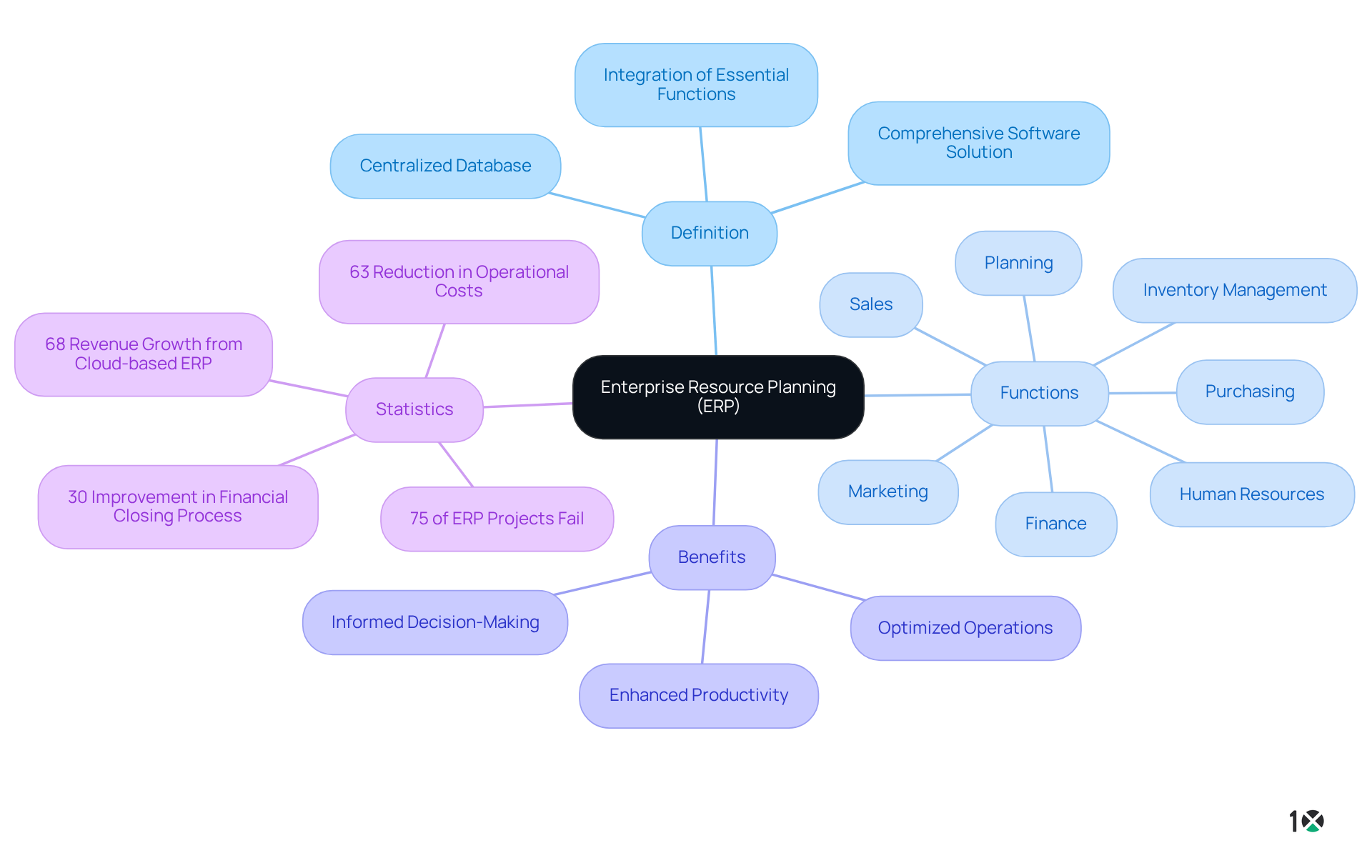
Contextualize ERP: Importance in Modern Business Operations
In today’s corporate landscape, organizations are under constant pressure to enhance efficiency, cut costs, and boost customer satisfaction. The ERP definition includes solutions like 10X ERP that play a crucial role in meeting these demands by offering a centralized platform for managing diverse business processes. With an intuitive user onboarding experience, 10X ERP allows organizations to quickly add users, assign roles, and grant access, ensuring teams can start leveraging the platform immediately.
ERP solutions empower organizations to make informed decisions and respond swiftly to market changes, illustrating the ERP definition of facilitating real-time data access. For example, businesses can monitor inventory levels, streamline supply chain operations, and evaluate financial performance all within a single platform. This integration significantly enhances operational effectiveness and optimizes resource allocation. Notably, 66% of organizations report improved operational performance due to their ERP solutions, while 62% acknowledge that these tools align with the ERP definition of cost reduction. Additionally, 41% of organizations indicate that their ERP systems, as per the ERP definition, have increased employee satisfaction, underscoring the extensive benefits of these solutions.
The personalized support offered by 10X ERP ensures users can access assistance whenever necessary, fostering a collaborative environment that enhances customer value. As companies grow, the built-in scalability of ERP solutions, according to the ERP definition, guarantees they can adapt to changing needs without major disruptions. Furthermore, the average return on investment for an ERP project is 52%, emphasizing the financial benefits tied to implementation. This highlights the essential role of the ERP definition in driving both internal efficiencies and external customer engagement.
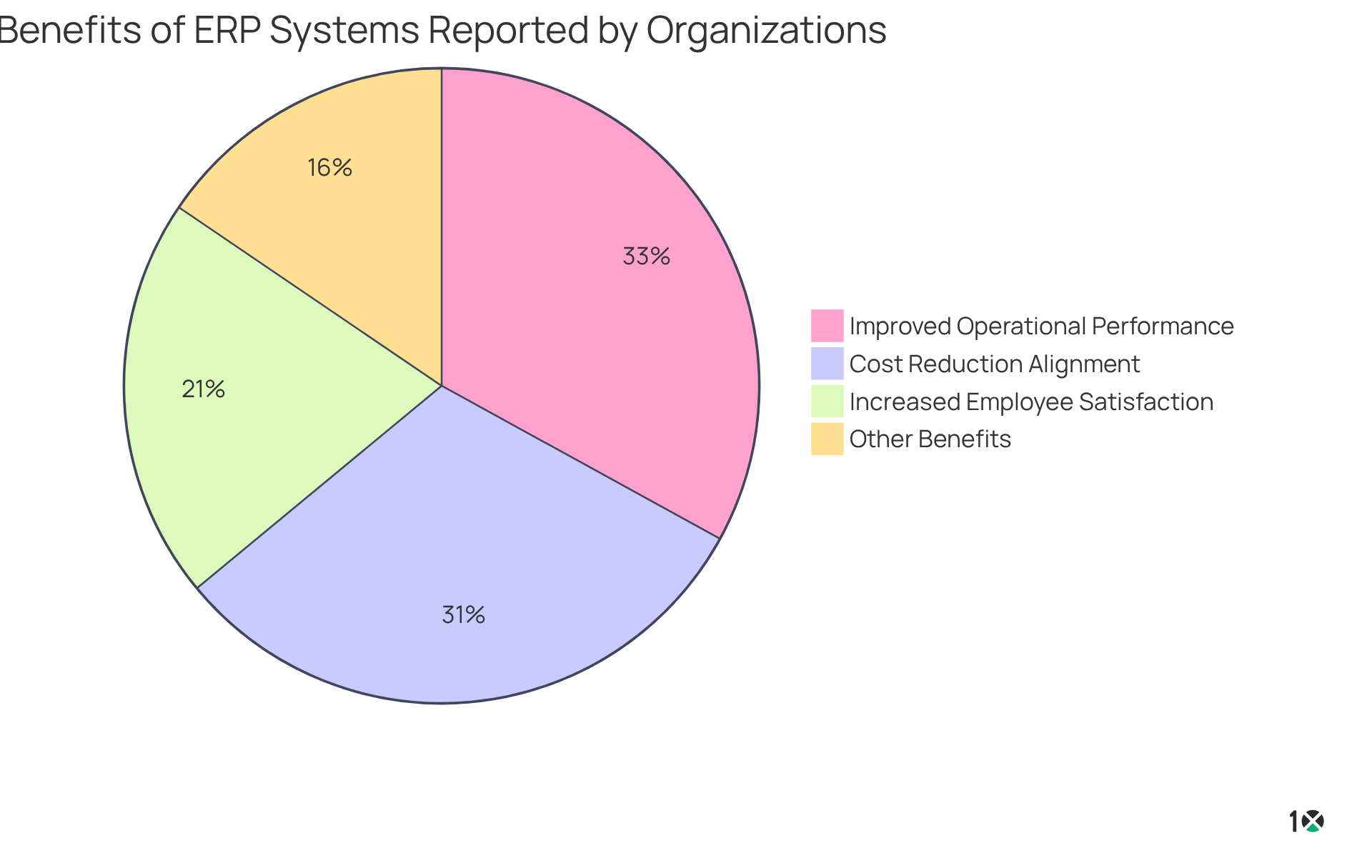
Identify Key Features: Core Components of ERP Systems
The core components of ERP solutions, as described in the ERP definition, encompass essential modules such as:
- Finance and accounting
- Human resources
- Supply chain management
- Customer relationship management (CRM)
- Inventory management
Each module is meticulously designed to fulfill a specific role while ensuring interconnectivity, facilitating seamless data flow across departments. For instance, the finance module automatically updates financial records based on sales data from the CRM module, thereby enhancing accuracy and minimizing manual entry errors.
Key features of 10X ERP include:
- Robust accounting with real-time data processing
- Flexible user permissions
- A comprehensive audit trail, empowering stakeholders to make informed decisions
Moreover, sophisticated inventory management systems, equipped with customizable tracking and lot/serial item monitoring, guarantee that companies maintain precise oversight of their inventory at all times. These features collectively enhance productivity; small enterprises employing ERP solutions report a 36% quicker decision-making process post-ERP definition implementation.
Additionally, the introduction of an ERP system, which can be understood through its ERP definition, eliminates manual data input, conserves time, and significantly reduces human errors, enabling businesses to experience a 30% improvement in performance for rule-based activities. The integration capabilities of 10X ERP enable smooth data flow between different modules and external applications, while the scalability and flexibility offered by its cloud-based solutions provide businesses with the adaptability essential for growth. This integration of finance, HR, and inventory management modules is crucial for optimizing operational efficiency and supporting informed decision-making.
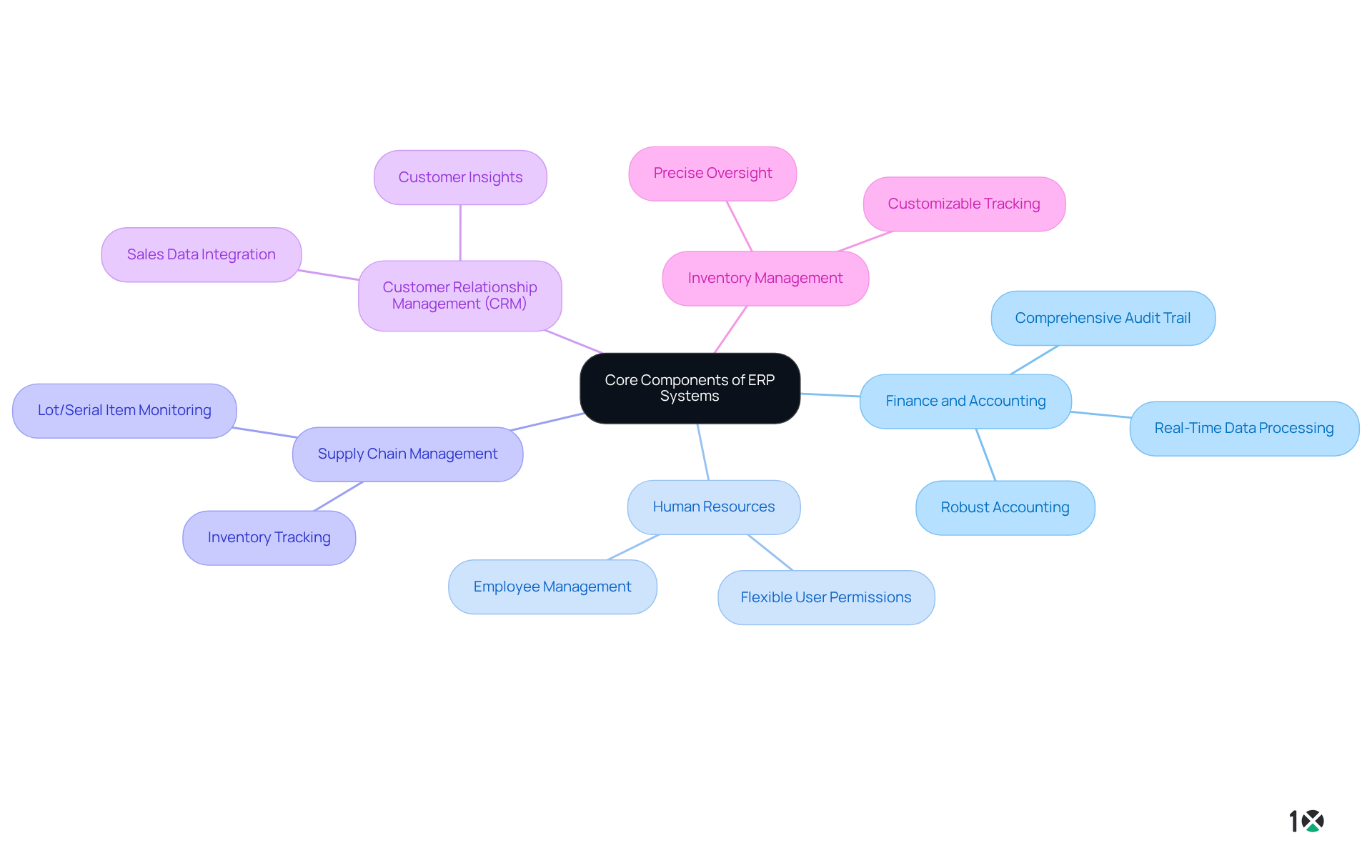
Trace the Evolution: History and Development of ERP Systems
The concept of Enterprise Resource Planning (ERP) originated in the 1960s, rooted in Material Requirements Planning (MRP) frameworks that primarily focused on manufacturing processes. As organizations recognized the need for integrated solutions that extended beyond production, the ERP definition emerged in the 1990s, signifying a broader scope that encompasses various organizational functions. The advent of cloud computing in the 2000s revolutionized ERP systems, making them more accessible and adaptable for businesses of all sizes.
Today, modern ERP solutions, such as 10X ERP, harness advanced technologies to deliver real-time data processing, robust inventory management, and seamless integrations, significantly enhancing operational efficiency for wholesale distributors. 10X ERP sets itself apart with its user-friendly experience, transparent pricing, and exceptional support, empowering organizations to navigate their ERP journey with confidence.
Recent statistics reveal that:
- 65% of companies opted for cloud-based ERP platforms in 2023
- 53% of enterprises with ERP systems utilize cloud solutions
This underscores a marked trend towards cloud adoption. Furthermore, the global ERP software market is anticipated to reach USD 123.41 billion by 2030, with the cloud ERP market specifically projected to hit $140 billion by the same year. This reflects the increasing demand for integrated solutions that enhance operational efficiency across diverse industries.
However, it is crucial to acknowledge that 50% of ERP implementations fail during their initial attempt, highlighting the challenges organizations face in adopting these solutions. This evolution underscores the critical role of ERP systems, like 10X ERP, in providing an ERP definition that supports complex business operations in a digital-first world.
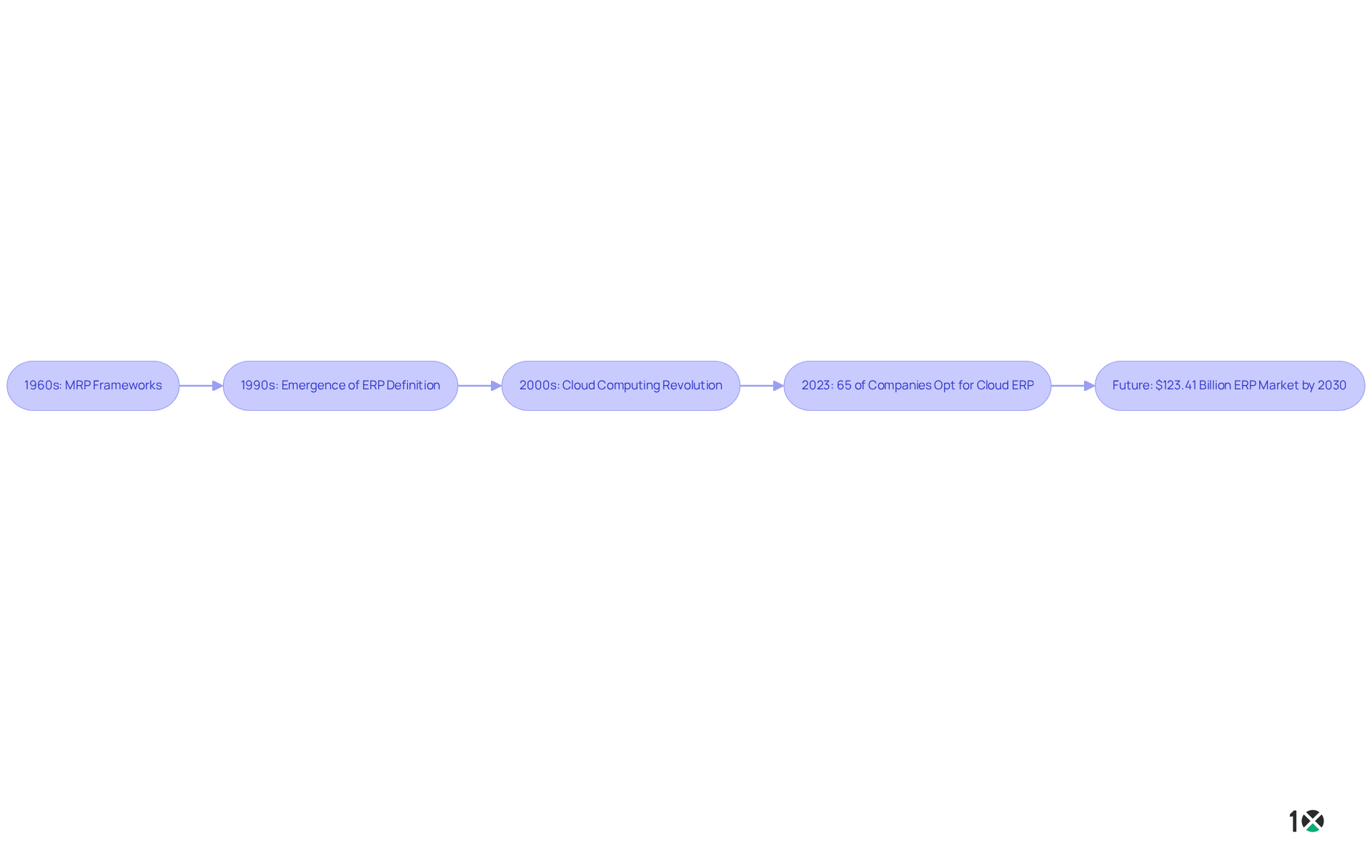
Conclusion
Enterprise Resource Planning (ERP) systems are indispensable tools that empower organizations to integrate and manage their core business processes with efficacy. They provide a unified platform for functions such as finance, human resources, and supply chain management, thereby enhancing operational efficiency and supporting informed decision-making. Understanding the ERP definition is crucial, as it has the capacity to eliminate data silos, streamline workflows, and facilitate real-time access to critical information.
This article underscores key insights into the significance of ERP for operations managers, illustrating how these systems contribute to revenue growth and cost reduction. Data indicates that a substantial percentage of organizations report improved performance and employee satisfaction following ERP implementation. Moreover, the evolution of ERP systems showcases their adaptability to contemporary business needs, particularly with the emergence of cloud-based solutions that offer scalability and flexibility.
Ultimately, embracing ERP solutions is vital for businesses striving to excel in a competitive landscape. As organizations persist in their quest to optimize operations and enhance customer value, investing in robust ERP systems will not only streamline processes but also position them for sustained growth and success. The future of business operations increasingly relies on the effective utilization of ERP technologies, making their understanding and implementation more critical than ever.
Frequently Asked Questions
What is ERP?
ERP stands for Enterprise Resource Planning, which is a comprehensive software solution that organizations use to manage and integrate essential functions such as planning, purchasing, inventory management, sales, marketing, finance, and human resources.
How does ERP benefit organizations?
ERP benefits organizations by optimizing operations, enhancing overall effectiveness, eliminating data silos, and fostering a centralized database that provides a single source of truth for all organizational activities.
What impact does ERP have on decision-making?
By providing a centralized database and eliminating data silos, ERP empowers organizations to make informed decisions and refine their strategic planning.
What statistics highlight the effectiveness of ERP solutions?
According to statistics, 68% of organizations report revenue growth attributed to cloud-based ERP solutions, while 63% experience a reduction in operational expenses.
Why are ERP solutions considered indispensable for modern enterprises?
ERP solutions are considered indispensable for modern enterprises because successful implementations can lead to remarkable improvements in productivity and operational efficiency.
